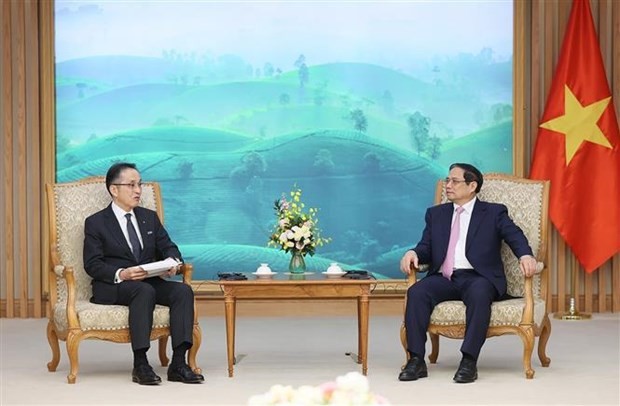
Prime Minister Pham Minh Chinh addresses WEF’s Country Strategic Dialogue on Vietnam
Latest
 |
| PM Pham Minh Chinh addresses WEF’s Country Strategic Dialogue on Vietnam: Prime Minister Pham Minh Chinh addresses the WEF's Country Strategic Dialogue on Vietnam in Davos, Switzerland on January 16, 2024. (Photo: VNA) |
The event saw the participation of Joo-Ok Lee, Head of Regional Agenda for Asia-Pacific at the World Economic Forum (WEF) and about 60 leaders from the WEF’s global member groups.
This is one of eight national dialogue activities held within the framework of the 54th annual World Economic Forum (WEF) to introduce Vietnam’s socio-economic development strategy, priority areas to draw investments, and specific policies that the Government will carry out in the future in order to create an attractive environment to investors.
At the dialogue, partners showed their interest in Vietnam’s policies in emerging areas such as green transition, renewable energy development, rare earth exploitation, semiconductor industry development, carbon credit market, and power development plan implementation.
The Prime Minister affirmed that transforming, finding and creating new growth drivers is an inevitable trend in today's world; no country or economy can develop rapidly and sustainably if it still maintains old thinking, and only relies on traditional growth drivers.
He stressed to promote transformation and creation of new growth drivers, Vietnam will focus on four main groups of solutions, namely reviewing and perfecting institutions and laws with the spirit of creating the most favourable conditions for businesses and investors; developing infrastructure with focus on strategic infrastructure, especially transport infrastructure, digital infrastructure, and infrastructure to respond to climate change; developing human resources, especially high-quality human resources; and restructuring the economy associated with renewing growth model, with priority given to renewable energy industries, green transition, digital transformation, semiconductor industry, and innovation.
Prime Minister Chinh said Vietnam is accelerating transformation, including economic transformation with the renewal of old growth drivers and promotion of new growth drivers; digital transformation, green transition, the development of circular economy, sharing economy, knowledge-based economy; transformation of mechanisms and policies, building strategic infrastructure for transformation; and human resources transformation.
Highlighting the country’s potential, Chinh suggested the WEF and its members continue cooperating with Vietnam, while calling on investors to accompany the country to intensify investment in priority areas such as innovation, high sci-tech, including semiconductor technology and artificial intelligence. He affirmed that Vietnam always accompany and cooperate with investors in the spirit of win-win cooperation, harmonised benefits, and shared risks.
Agreeing with Prime Minister Chinh’s speech, WEF leaders and representatives of businesses spoke highly of the achievements in recovery, development, growth of economic size, trade scale, as well as Vietnam's determination to transform and economic prospects. They assessed Vietnam as one of the bright spots for economic recovery in the region, playing a pioneering role in growth model renewal and commitments to energy transition.
The WEF said Vietnam is one of the countries drawing most interest from the business community at this meeting.
Many businesses affirmed their pleasure with investment projects in Vietnam, and showed their impression on the Vietnamese Government’s policies and drastic measures to create an attractive environment as well as its support to the business community.
The business community said that Vietnam is one of the most suitable options, a destination for those seek long-term investment and cooperation opportunities. They wished to continue to support and accompany Vietnam in its development and transition process, while suggesting Vietnam continue sharing issues that the country needs to support, and maintaining stable, long-term policies.













